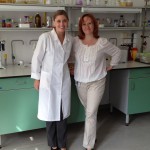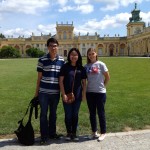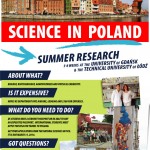This summer, Janusz Grebowicz, associate professor of chemistry and physics, co-founded a two-week program that brought together the world’s preeminent specialists to teach over 30 students from Russia, Poland, Sweden, the United States and other countries on the reposition of the spent fuel in geological formations.
Held in Oskarshamn, Sweden, and organized by Professor Waclaw Gudowski from the Royal Institute of Technology, the program was hosted by Swedish organizations: Linnaeus University; the Royal Institute of Technology; Nova – the Center for University Studies, Research and Development; and the Swedish Nuclear Fuel and Waste Management Company.
“Sweden is the largest producer of nuclear energy per capita in the world,” Grebowicz said. “They have some of the best infrastructure and research facilities to host a project like this.”
Read Whole StoryNa zdjeciach: Christa Landowski z Prof. Sylvia Jafra w U. Gdansk, laboratorium Biotechnologii. Na drugim Christa, Mau i Vi (oboje byli w Uniwerstytecie Technologicznym w Lodzi) na spotakaniu w Wilanowie. Wszyscy na dwumiesiecznych stazach badawczych.
Antoine, one of the students who participated in the program wrote:
I would like to take this time out to share how UHD’s research program has been incredibly beneficial to me individually and career wise.
A brief summary of my background is as follows: I graduated with a undergraduate in Industrial Chemistry with extensive research experience studying oil shales and their impacts mostly using thermogravimetric analysis mass spectrometry (TGA-MS) under the direction of Prof Grebowicz.
I have also done research involving carbon nanotubes as an environmental sensor under the direction of Prof Jiang. In addition to these things I was a member of UHD’s Scholars Academy and participated in a summer research trip to Poland where I had the pleasure of working with Prof. Wysocki.
Having graduated in the summer of 2010 which was only a couple years removed from the financial crisis, I knew finding employment would be a challenge. Be that as it may, I knew that I had the necessary background to be competitive in the workforce. I floated my resume to prospective employers and quickly got positive responses. I chose a position as a lab analyst for Heineken due to its reputation as a strong and respectable multinational corporation. During the interview process the interviewer, who would later become my manager, was very excited and interested in the amount of research I had done. Which led to me being able to streamline analytical methods using my knowledge of the machines that were there. After observing how comfortable I was working with the machines, I was given a special project to analyze the impact of adding a new bottle type to the entire packaging line. The concepts I learned through research such as hypothesis testing and how to structure a research report gave me the tools and confidence to complete this assignment. Due to how well received my report on the new bottle type was, I got promoted to the position of a Brewer withing two (2) years. Becoming the youngest candidate selected at the plant in their Nassau, Bahamas location. Here I was presented with further opportunities to achieve targets by identifying underlying issues and how each process interacted with each other. This is why I am writing to express my appreciation for and support of UHD’s undergraduate student research opportunities.
The student research program at UHD has been a wonderful asset to me and it has not only been intrumental in helping land a career, but also propeling me forward along the corporate chain. If there is anything I can do to help, I would be more than happy to contribute. Thank YOU!



